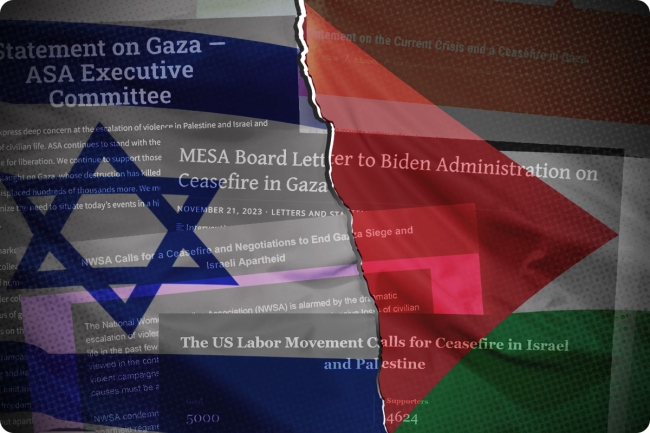You have /5 articles left.
Sign up for a free account or log in.

Multiple scholarly associations have spoken out about the Israel-Palestine conflict. Others have stayed silent.
When the American Association of University Professors last week called for “an immediate ceasefire and end to the siege of Gaza,” it was just the latest union to endorse the same labor movement statement.
But the AAUP isn’t only a union. It’s the paramount national faculty group in the U.S., and its academic freedom guidelines seek to protect even controversial, and dissenting, speech. Now, by signing the Gaza statement, the AAUP has itself taken a position in the most contentious campus debate of recent times.
After the decades-long Israel-Palestine conflict exploded into yet another war on Oct. 7, students, professors, alumni and others criticized various university presidents for either not commenting on the violence against either Israelis or Palestinians, or both, or for commenting poorly on it. The current crisis intensified a debate that has carried on from the fall of Roe v. Wade in 2022, the Black Lives Matter protests of 2020 and, much longer ago, the Vietnam War: When, and how, should universities, their leaders and their academic departments comment on current political controversies?
But less media attention has been paid to the academic groups that bring together faculty members from multiple colleges and universities. These include the pan-faculty AAUP and academic disciplinary associations.
These organizations have, like universities, differed in whether, and how, they’ve spoken about the Israel-Palestine conflict. Some have likewise faced controversies for their stands, with critics questioning whether scholarly associations should take positions in political controversies—and some arguing that they weren’t being fair to their Jewish or Israeli members in the stands they took.
The Boycott Battle
The Middle East is not new terrain for scholarly associations. Before Oct. 7, the campaign for an academic boycott of Israel roiled a few associations. The debate over whether to call for these boycotts—and to back the boycott, divestment and sanctions movement broadly—foreshadowed the current debate over what to say and how to say it.
In 2013, the Association for Asian American Studies became the first U.S. scholarly organization to join the boycott of Israeli universities, according to the U.S. Campaign for the Academic and Cultural Boycott of Israel.
Then, roughly a decade ago, members of the American Studies Association—who include professors in Indigenous studies, gender studies and other areas—voted to endorse the boycott. Some current and former members sued, arguing the association had breached its contract with members and misappropriated funds to defend and promote the boycott. The litigation is still ongoing.
In 2016, members of the American Anthropological Association declined to endorse a boycott by a margin of just 39 votes out of the roughly 4,800 members who voted. However, in essentially a redo last summer, members voted 2,016 to 835 to pass a resolution to “boycott Israeli academic institutions until such time as these institutions end their complicity in violating Palestinian rights as stipulated in international law.” That vote came despite criticism from Israel supporters, including a lawsuit threatened after voting began.
In 2017, the Modern Language Association’s Delegate Assembly voted, 113 to 79, to reject a boycott. It instead passed, 101 to 93, a resolution calling for the MLA to refrain from endorsing one. But, last month, well into the current war, the assembly passed a pro-Palestine “emergency motion” during the MLA Annual Convention.
That motion didn’t back a boycott, but it defended college and university employees and students who are facing threats, harassment and violence for criticizing Israel’s own violence against Palestinians. Only a handful of the 140 delegates in attendance (out of 279 total) voted no. The delegates then rejected, by a wide margin, a motion backed by Israel supporters that generally defended “academic freedom and free expression” but didn’t mention Palestine or Israel.
The AAUP, for its part, continues to oppose these boycotts, saying on its website that they “strike directly at the free exchange of ideas.”
While scholarly associations have been divided over boycotting Israeli academic institutions, multiple groups that Inside Higher Ed reached out to have shown more consistency in their stance on the current war in Gaza. Inside Higher Ed asked numerous organizations what statements they’ve issued over the past decade on the Israel-Palestine conflict—and especially what they’ve said since Oct. 7.
Pleas to Help Gazans
Strident defenses of Israel’s war are nonexistent among the statements provided to Inside Higher Ed. Defenses of Gazans are not. Multiple statements decried violence against both sides, and some condemned Hamas’s Oct. 7 attack, but predominant were calls to end the deaths and suffering among Palestinians.
The American Studies Association Executive Committee, in an online statement it said it last updated Oct. 24, expressed “deep concern at the escalation of violence in Palestine and Israel.” It also said it recognizes “the need to situate today’s events in a historical, political and regional understanding” and “joins the chorus of global demand for an immediate ceasefire and release of humanitarian aid to Gaza, and calls on the U.S. to end support of Israeli apartheid.”
The National Women’s Studies Association (NWSA) came out early in favor of a ceasefire. It issued a statement Oct. 11 denouncing U.S. support for “Israel’s apartheid regime” and reaffirming its 2015 resolution supporting the boycott, divestment and sanctions movement.
The association “is alarmed by the dramatic escalation of violence in Palestine and Israel,” the Oct. 11 statement said. “We mourn the extensive loss of civilian life in the past few days and over the last 75 years. The current escalation must be viewed in the context of decades of illegal Israeli military occupation and systemic violent campaigns in the West Bank and Gaza Strip. To end the violence, its root causes must be addressed. Military attacks will only exacerbate human suffering!”
On Oct. 29, NWSA weighed in again, opposing “the genocidal war on Gaza” and saying, of the U.S., that “sponsoring violence against a caged population in the name of ‘self-defense’ makes us complicit in crimes against humanity!” The Oct. 29 statement further called for “college administrators to extend their commitment to address antisemitism to include concern for anti-Muslim and anti-Arab hate speech and violence.”
On Oct. 16, the Middle East Studies Association of North America’s Board of Directors released a long statement, saying, “There can be no justification for the targeting of civilians.”
The board continued on to say it believes “there is no military solution,” and that Israel’s counterattack “risks becoming a campaign of ethnic cleansing.”
“The bombardment has resulted in massive and ongoing death, displacement, and destruction, imperiling—among many other things—even the possibility of access to education for generations of Gazan children and students into the indefinite future,” it said, going on to decry free speech limitations on American campuses regarding the war.
In November, the association’s president, Aslı Ü. Bâli, a Yale Law School professor, wrote to President Biden on the group’s behalf. She called for “an immediate, unconditional and permanent ceasefire by all parties” and said Hamas’s hostages “themselves are imperiled by the ongoing bombardment and ground incursion.”
More recently, on Jan. 26, the African Studies Association announced it “rejects the ongoing violence, violations of international law, and indiscriminate killing of civilians” from Oct. 7 on and called for “the unconditional release of hostages and an immediate ceasefire in Gaza.”
Not Quite a Ceasefire Call
Other scholarly groups have been less emphatic about what should be done while still decrying the violence. An American Psychological Association spokeswoman told Inside Higher Ed the association has made just one statement on the conflict, on Oct. 11.
“The American Psychological Association has condemned in no uncertain terms the recent violent attack by Hamas on Israel,” it starts off. “We recognize that the situation is complicated, but there can be no justification for acts of indiscriminate violence. There can be no justification for holding people hostage.”
But the statement goes on to reference Palestinian suffering: “There can be no justification for cutting off access to basic necessities, such as electricity, food and medicine. APA is gravely concerned for the physical safety and mental health of the millions of Israelis and Palestinians affected by this growing surge in violence.”
The American Academy of Religion Board of Directors said on Oct. 24, “We condemn the killing of Israeli civilians and the taking of Israeli hostages by Hamas. We condemn the lethal violence against Palestinian civilians and the decades-long occupation and denial of human rights to Palestinians by Israel’s government. We recognize the error of equating people with their governments.” It also said it “rejects all forms of colonialism, dispossession, occupation, hegemony, and violence.”
An American Sociological Association spokesperson provided Inside Higher Ed one post–Oct. 7 statement. It’s from this month, and it mostly defends academic freedom without saying whether one side of the conflict or the other is facing more censorship. It didn’t specifically call for a ceasefire, but said, “We join sociologists across the world in calling for conditions that will support lasting peace.”
The American Society of International Law’s president, Gregory Shaffer of Georgetown University Law Center, released an Oct. 13 statement saying that all sides “must comply with international law, and in particular international humanitarian law, which prohibits both targeted as well as indiscriminate killing of civilians.” But the statement was particularly critical of Hamas’s Oct. 7 attack.
“Among those murdered and abducted are children, women, the elderly, and the disabled,” Shaffer wrote. “These acts constitute war crimes and crimes against humanity, and they must be condemned. As required by international law, the hostages must receive proper treatment and be released immediately.”
A statement an Association for Jewish Studies spokeswoman provided Inside Higher Ed was “unequivocal” in condemning Hamas’s attack. This statement, from Oct. 10, referenced an Oct. 9 statement that the AJS executive committee said it realized “was inadequate.”
“The members of the AJS executive committee unequivocally condemn Hamas for killing and kidnapping hundreds in Israel, targeting civilians, and perpetrating horrific atrocities,” the updated statement said. “We remain shocked and devastated by these awful events. We stand with our members who are in Israel as these traumatic events unfold and pray for everyone’s safety and security.”
Three statements—on Oct. 16, Oct. 20 and Oct. 31—from the Society of Biblical Literature are a reminder that speaking out is a risk. The Oct. 31 one begins, “At a time when both silence and words are subject to multiple interpretations, often contradictory ones, we regret the pain and indignation our successive statements have caused to many of our members. Council does not wish to issue further statements about the tragic events in Israel and in Gaza. Rather, Council wishes to clarify that both of its recent statements stand side by side.”
The most common approach among the scholarly associations Inside Higher Ed contacted hasn’t been to speak for one side or the other, or both. It’s to say nothing.
Silence
Jim Grossman, executive director of the American Historical Association, pointed to his organization’s “Guiding Principles on Taking a Public Stance,” which were approved in 2007 and revised in 2017. Those principles say the association “has the responsibility to take public stands” in certain situations, including against censorship, limitations to historians’ free movement and threats to the preservation of or free access to historical sources.
In an email, Grossman said his group hasn’t issued statements over the past decade on the Israel-Palestine conflict because “events in the Middle East, important and complex as they are, have not fallen within the parameters of those guidelines.”
The American Political Science Association didn’t return requests for information, and its website shows no statements, at least since Oct. 7. The American Association of Geographers’ executive director, Gary Langham, said in an email that his organization hasn’t released any statements on the conflict in at least the past five years.
Among other groups to say they’ve issued no statements: the World History Association, the Society of Military History, the Society for Historians of American Foreign Relations, the Association for Asian Studies (not Asian American Studies), the American Philosophical Society, the Mathematical Association of America and the American Mathematical Society.
Last week, the Academic Freedom Alliance, Heterodox Academy and the Foundation for Individual Rights and Expression, three groups that advocate for free expression in academe, released a letter calling on university board members to adopt “a policy of institutional neutrality on social and political issues that do not concern core academic matters or institutional operations.” The letter said university statements “risk establishing an orthodox view on campus.”
The letter also quoted the University of Chicago’s 1967 Kalven report, a frequently cited statement on the importance of institutional neutrality that says the university “is the home and sponsor of critics.” But the three groups’ letter also says that “institutional neutrality applies only to leaders and units of the institution … It does not apply to faculty members and students (i.e., the ‘critics’), either individually or as members of voluntary, non-institutional associations.”
A spokeswoman for FIRE said that “because those groups are private entities, we don’t take a position on whether they should issue statements.” And Keith Whittington, founding chair of the Academic Freedom Alliance and William Nelson Cromwell Professor of Politics at Princeton University, said the letter doesn’t address scholarly associations.
But Whittington said he personally sees risks, albeit lower ones than for institutions, for associations issuing statements. “They don’t have the same kind of control over people’s careers that universities do and university departments do,” he said of associations—but they “should be cognizant of the fact that they are potentially marginalizing a subset of their members.”
He said he’s a member of the American Political Science Association, and he’d be “very annoyed” if it were issuing statements on his behalf.








